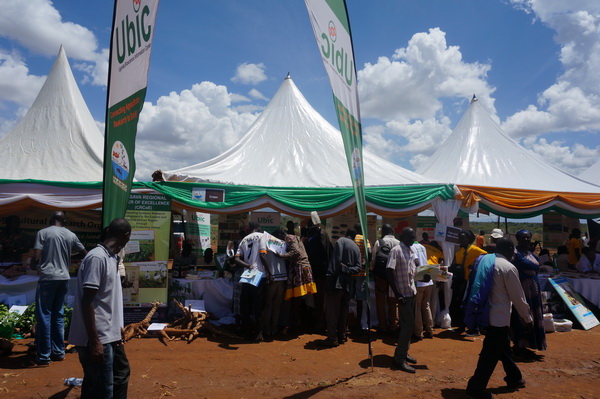
Ugandan Farmers' Demand for Biotech Intensifies
October 24, 2018| |
Farmers across Uganda have continued to mount pressure on local leaders and government to allow them to grow biotech crops on their farms. This was during a series of agricultural biotechnology and biosafety awareness activities organized by Uganda Biosciences Information Center (UBIC), together with other biotech stakeholders between June and October 2018. These workshops brought together extension services, farmers, community, religious and cultural leaders.
Mr. Deogratius Eteru, a retired civil servant and farmer leader from eastern Uganda, expressed disappointment over Uganda's Parliament for delaying to enact a legislation that would allow them to access disease resistant cassava varieties. "We have been waiting for the biotechnology law since 2012 so that we grow disease resistant biotech cassava. Why should we continue to grow disease prone cassava varieties yet we know scientists at NARO have superior varieties?" Mr. Eteru noted.
During Uganda's Independence Day celebrations in central Uganda, farmers who stopped by the UBIC tent consistently asked why they cannot access the disease resistant and drought tolerant crops. They were not interested in the process, but in the products. In another related activity with Uganda National Farmers Federation (UNFFE), the largest umbrella body for farmers, farmer leaders promised to work with NARO and UBIC to develop a more structured engagement on agricultural biotechnology with the various UNFFE networks across Uganda.
The president of UNFFE, Dr. Dick Kamuganga, noted that such an arrangement would make farmer leaders lend their support to the voices of scientists. He explicitly offered the support of his trained team in pushing for the passage of the Biosafety Act 2017. World Food Day celebrations in the semi-arid areas of the northeastern region provided an opportunity to educate the populace about modern agricultural biotechnology and the importance of regulatory systems. Farmers look forward to accessing crop varieties that are drought resistant.
For more details, send an e-mail to ubic.nacrri@gmail.com.

| |
Biotech Updates is a weekly newsletter of ISAAA, a not-for-profit organization. It is distributed for free to over 22,000 subscribers worldwide to inform them about the key developments in biosciences, especially in biotechnology. Your support will help us in our mission to feed the world with knowledge. You can help by donating as little as $10.
-
See more articles:
-
News from Around the World
- Ugandan Farmers' Demand for Biotech Intensifies
- Kenyan President Okays Planting of Bt Cotton
- Ethiopian Government Banking on Agri-biotech to Help Steer Economic Development
- Grass Genes for Breeding Better Crops
- Scientists Review Gene Edited Crop Regulation in the US
- USDA Approves GE Low-Gossypol Cotton
- Enzyme Plays Key Role in Plant Response to Cold
- First GM Crop in Indonesia Soon to be Commercialized
- UK Teen Survey Reveals Attitudes Towards Food and Farming
- Hormone Makes Plant Growth Possible in Space
-
Research Highlights
- Sugar Transporter Genes Contribute in Wheat Grain Weight During Drought
-
From the BICs
- PH Experts Provide Training on Eggplant Germplasm Characterization
- PABIC Collaborates with ICCBS and HEC for Science News Writing Course
-
Resources
- Science and She: Dr. Barbara Mugwanya Zawedde
- Updated Pocket Ks on GM Traits
-
Plant
- Cas14: The Newest Addition to the Gene-editing Enzyme Family
- Researchers Present Gene Editing Applications in Horticultural Crops
- CRISPR-Cas9 Used to Retain Function of Mutated Growth Gene in Tomato
-
Read the latest: - Biotech Updates (January 14, 2026)
- Gene Editing Supplement (December 17, 2025)
- Gene Drive Supplement (February 22, 2023)
-
Subscribe to BU: - Share
- Tweet
